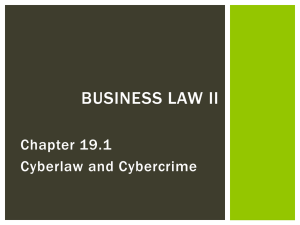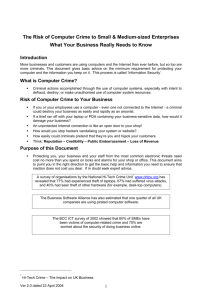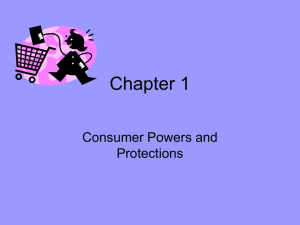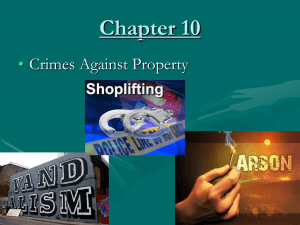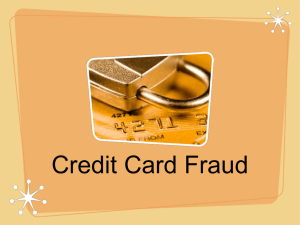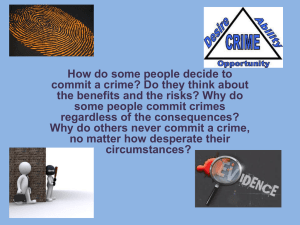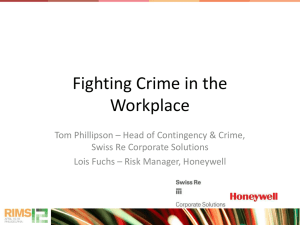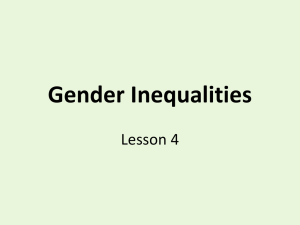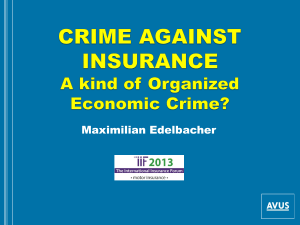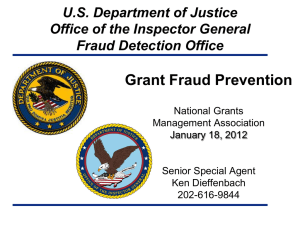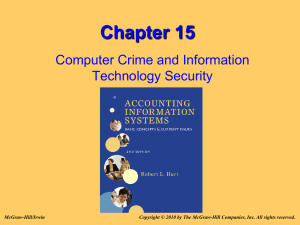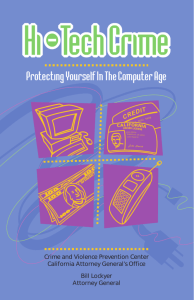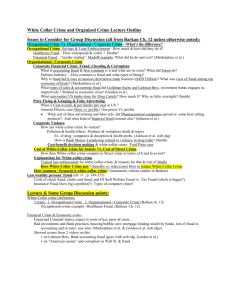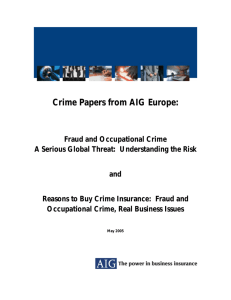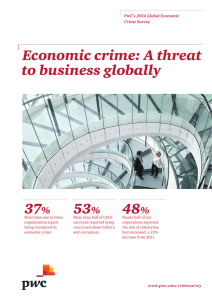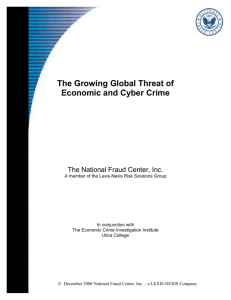For the Love of Money
advertisement
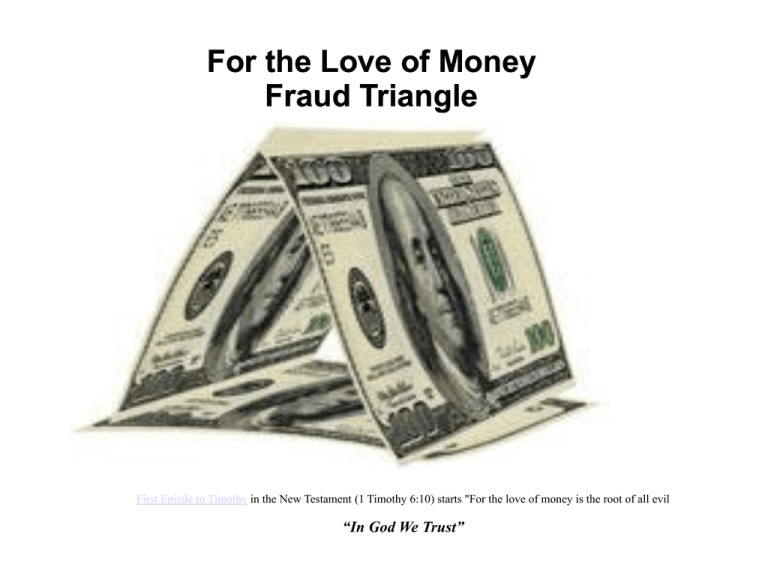
For the Love of Money Fraud Triangle First Epistle to Timothy in the New Testament (1 Timothy 6:10) starts "For the love of money is the root of all evil “In God We Trust” What Causes People to Steal: You can be heart broken. You can be broke. But never be heart broken and broke at the same time. Fraud/ LoveTriangle Need can be either real or perceived. An individual might feel the need for a luxury car or vacation home. There might also be more pressing needs, like a house payment or credit card bills. Opportunity arises when someone is given control over funds without proper supervision. This could happen in many ways, such as requiring only a single signature on a check, allowing credit card purchases to be approved by the person who is using the card or not maintaining strict controls over which vendors are used. Fraud/ LoveTriangle Rationalization is another critical aspect of the decision to commit fraud. Most people do not have an innate desire to steal and individuals who do so often convince themselves that circumstances justify the crime. Rationalization may take many forms. In some cases, an individual may justify workplace theft by thinking the money can be paid back later. Often persons committing fraud think they are somehow “owed” the money they take and therefore their crimes are justified. A thief might also rationalize by arguing that the organization is wealthy or wasteful, therefore stolen money won’t be missed. Fraud/ LoveTriangle Realizing that fraud can happen at any level of government, it is important to conduct a risk assessment of your operation to find out where internal controls may be weak. This would include looking at your policies and procedures to determine if internal controls and monitoring procedures are strong enough to deter and detect fraud in its many forms. Even with the best prevention methods, fraud and theft can still occur, which is why detection measures are critical as well. What Causes People to Steal: Opportunity The phrase “crime of opportunity” does have a basis in actual statistics. When a person sees an opportunity to commit a crime and gain an instant reward (such as a laptop sitting on the seat of a locked car), the chances increase that they will take that opportunity. Now, this isn’t to say that every time a person sees an opportunity commit a crime, that they will do it – it should simply be regarded as a contributing factor. Poverty Many people believe that crime rates are affected by the state of the economy. In our post, “Do Crime Rates Increase During Hard Economic Times?“, this topic was explored a bit more in-depth. However, a person’s level of poverty can have an influential effect on how likely they are to commit a crime. For example, if a man is having trouble making enough money to feed his family, he may resort to crime as an attempt to provide for them. If an individual has fallen on hard economic times, they may see theft as an easy way to make some quick cash. Anonymity One of the most commonly cited factors that influences the likelihood that a person will commit a crime is anonymity. When an individual believes that they can commit a crime without getting caught, they are much more likely to steal. The fear of being exposed during a criminal act may be the sole factor that prevents a person from committing a crime. Some Ways Employees May Be Stealing: Under-ringing of sales and the tearing up order tickets are two longtime scams in the food and beverage industry. An employee serves a customer in the restaurant, and the customer pays the check at the meal's end, but instead of putting the money and ticket in the register, the employee tears up the order ticket and pockets the cash. The restaurant owner has no record of that order or money tendered. Or an employee sold something for $17.50," and rang in $7.50 The employee put the $17.50 in the register and at the end of the night, would pocket the extra $10.00. Since the cash in the register drawer would match the transactions listed on the register tape, the theft would not be known Voided sales - the cashier voids the check or some of the items on the check and keeps the proceeds Over-rings - the cashier records an "over-ring" to reverse an actual sale. Cashier records sales on the training key which does not feed into the cash register's daily or cumulative sales total. Cashing hot check for friends. Some Ways Employees May Be Stealing: Running the credit card through twice. Returned drinks - bartender claims that a drink was returned when in fact it was sold and pocketed the money. Servers padding their checks with small amounts or using the same check over and over using a common order. They may even give a verbal check and pocket the money Produce surplus food so that it can be taken home. Employee steals and uses gift certificates (for example, they might take a two-forone coupon and attach it to a guest check for which the customer paid cash and take the cash). Some Ways Employees May Be Stealing: Food theft or taking home supplies and employees giving food to their friends. Bartenders may bringing their own bottles and pocket the sales from them. Since they are using their on inventory, food costs and sales will match up. ' Phony paid-outs - (paid outs are amounts taken from the till to pay for food deliveries and other miscellaneous charges. Staff leaving early and coming in at a later time to clock out. Use the phone for long-distance calls. Some Ways Employees May Be Stealing: Customers will sometimes steal silverware, condiment bottles, salt & pepper shakers and tips that are allowed to sit in plain sight at empty tables. Employee steals cash and records it as "cash short." Revisit the restaurant during closed hours and steal whatever is available. Steal supplies , detergent, linens, paper towels, toilet paper, etc. Borrow the manager's keys and duplicate the void key, then void out entire or partial sales and pocket the money. Ethics Orientation for State Officials Incompatible Activities of State Officers and Employees A person may not act in an official capacity to regulate his or her private activity. For example, an employee who reviews license applications may not review his or her own license application. Receiving anything of value from a person who is seeking to do business with the official’s agency where the item of value could be reasonably interpreted as having been intended to influence the official is prohibited. Persons who wish to influence government often seek to do so by bestowing gifts of food, drink, entertainment and similar favors on officials. Unlike the Political Reform Act, which limits the amount of gifts, this provision focuses on the circumstances surrounding the gift and whether it reasonably appears that the purpose of the gift was to influence the official. Section 19990 does not establish any particular penalty for violating an Incompatible Activities Statement. However, civil service laws specifically provide that violation of an Incompatible Activities Statement can result in disciplinary action against civil service employees. Violation of an Incompatible Activities Statement also may constitute a violation of other laws as well. For example, using state resources for private gain may violate other provisions of the Government Code and Penal Code provisions. Remember These Points Examine your agency’s Incompatible Activities Statement to be sure you are not in violation of any of the provisions. Following is a list of important points. Use of State or Government time, resources and prestige for private gain is prohibited. Acceptance of a gift is prohibited if it is intended to influence or reward the official, and it is from a person doing business with the agency or regulated by it. Violations may result in personnel, civil or criminal sanctions.
